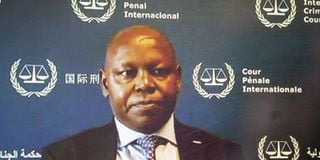Premium
Gicheru’s ICC case faces fresh hurdle in pre-trial appeal

Kenyan lawyer Paul Gicheru makes his first appearance before the ICC on November 6, 2020, before Judge Reine Adélaïde Sophie Alapini-Gansou of Pre-Trial Chamber A.
What you need to know:
- The 22-page appeal drawn by Principal Counsel of the OPCD, Xavier-Jean Keïta, in Dakar, Senagal, will determine whether the basis for the current proceedings is legally sound.
- The Appeals Chamber’s decision will also set a precedent for any future proceedings to be conducted on the basis of the provisional rule.
The Office of Public Counsel for the Defence (OPCD) at the International Criminal Court (ICC) has formally lodged an appeal against the hearing of lawyer Paul Gicheru’s case by a single-judge bench at the pre-trial stage.
The appeal, if successful, means Mr Gicheru, may have to wait longer as the process of his trial is likely to start afresh.
In the appeal, the OPCD wants the Appeals Chamber to order that Mr Gicheru’s pre-trial be handled by a chamber of three judges instead of one, who is currently Justice Reine Adelaide Sophie Alapin-Gansou.
The OPCD wants the Appeals Chamber to reverse Judge Alapin-Gansou’s ruling that Mr Gicheru’s pre-trial can be presided over by a single judge on the strength of a provisional rule (Rule 165) which is yet to be adopted by the Assembly of State Parties (ASP).
Judge Alapin-Gansou’s single-judge decision marks the first time that proceedings concerning offences under article 70 on administration of justice will be conducted on the basis of the Provisional Rule 165.
The 22-page appeal drawn by Principal Counsel of the OPCD, Xavier-Jean Keïta, in Dakar, Senagal, will determine whether the basis for the current proceedings is legally sound.
The Appeals Chamber’s decision will also set a precedent for any future proceedings to be conducted on the basis of the provisional rule.
The appeal will be heard by a five-judge bench headed by Appeals Judge Howard Morrison (from United Kingdom). Other judges in the bench are Chile Eboe-Osuji, Piotr Hofmański, Luz del Carmen Ibáñez Carranza and Solomy Balungi Bossa.
Fundamental rights
The OPCD has raised three issues for determination by the Appeals Chamber, one of them being whether the Provisional Rule 165 continues to be applicable considering that the Assembly of States Parties has not adopted a specific decision adopting, amending or rejecting it in accordance with the terms of article 51(3) of the Rome Statute.
The disputed provisional rule, which allows formation of a single-judge chamber, was introduced by the ICC judges acting in plenary on February 10, 2016.
The OPCD also wants the Appeals Chamber to determine whether the Pre-Trial Chamber erred in law in finding that “a new procedural regime commences at the initial appearance hearing and that the provisional rule only came into effect at that time”.
The third issue is whether the chamber erred in finding that the provisional rule is not incompatible with the statute on the grounds that article 70(2) of the Statute stipulates that “the principles and procedures governing the Court's exercise of jurisdiction over offences under this article shall be those provided for in the Rules of Procedure and Evidence”.
And, in addition, that Provisional Rule 165 does not restrict any of the fundamental rights enshrined in article 67 of the Statute.
The OPCD counsel argues that Mr Gicheru is now subject to a rule that was created only after he became a defendant in the case and one that restricts his procedural avenues to justice.





